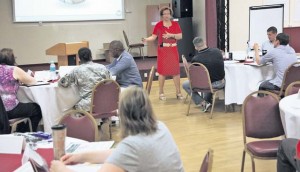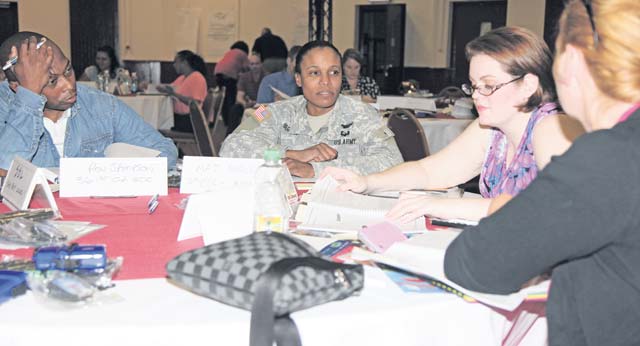With the war in Iraq over and the war in Afghanistan winding down the U.S. Army and, in particular, the U.S. Army Reserve is undergoing a significant transformation to remain ready and relevant in the future and so are Army Reserve Family Programs.
ARFP and their subset responsibilities including the family readiness groups have played a significant supporting role to Soldiers, military families, friends and their loved ones since 9/11 as the military deployment op-tempo has motored forward at a blistering pace.
With that in mind, more than 20 7th CSC Soldiers, civilians, family members and spouses descended on the Kaiserslautern Community Activities Center Aug. 1-3 for an ARFP-led FRG conference and training titled: “Training for FRGs in a New Era.”

“The course is designed to provide FRG volunteers with the knowledge, tools and skills required to establish and maintain an effective FRG,” Gary Gnidziejko the 7th CSC Family Programs director said. “Participants will explore the definition and mission of an FRG.”
The participants learned about FRG operations, regulatory guidance and how to support Soldiers and Families during their entire life cycle.
Also, “participants will be able to recognize the various roles and responsibilities of the command team and volunteers,” he added.
Day one dealt with registration, administrative details and an introduction to FRGs in a new era.
“It is important to bring training to the servicemembers and family members of the 7th Civil Support Command,” said James Cousar the training manager for ARFP and a Fort Bragg, North Carolina resident. “When you get a group this large and bring the training to them, it is cost effective and lets them know they’re still part of the team. It helps to build the relationship and connectivity with USARC [U.S. Army Reserve Command] and the subordinate commands. Not only that, they are motivated. This is the first time we’ve been over here in the last five years.”
The second and longest day of training included classes on family days in a new era, operational security, outreach and communication, volunteer management and the passport to learning.
“Training is going well, a lot of valuable information,” said Capt. James O’Keefe, operations officer, 209th Digital Liaison Detachment, 7th CSC, a Sioux City, Iowa native and the family readiness group liaison for his unit. “Their subject matter experts can speak to the topics. From a command perspective it is spot on. The information and regulatory guidance provided is either reinforcing what I already knew or at the same time dispelling some of the myths of what FRGs can and can’t do. The makeup of the participants is a good mix of experience including FRLs [family readiness leaders], commanders and volunteers. Some of the volunteers have six days experience and others up to 10 years.”
The three days of training also had breakout sessions that covered FRG use of social media, telephone/email chains and newsletter development.
The third and final day of the conference was a wrap up with instruction on FRG informal funds, values in action and team time before closing remarks.
“My goal is to support military families with life skills and information education,” Sugin Musgrave, a volunteer with the 7th CSC Headquarters and Headquarters Company FRG and a native of Detroit, Michigan, said.
In the past, Musgrave, who is an Air Force spouse, has been a volunteer with a similar type of Air Force program called “Key Spouse.”
“There are a lot of things I can take from this training,” Musgrave said. “This has given me information on the Army’s values and the protocols for their FRG programs.”



